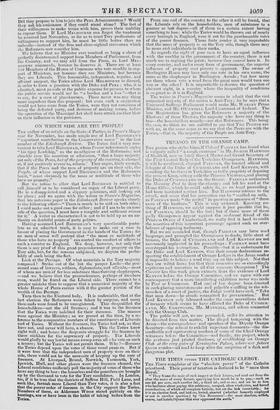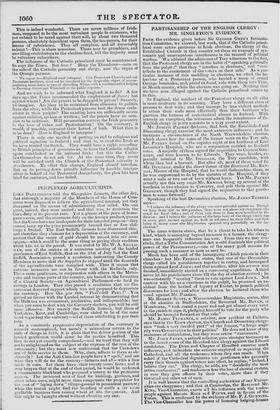TIIE TIMES versus TIIE CATHOLIC CLERGY. THE Times complains of
the "absolute power" of the Catholic priesthood. Their power of taxation is declared to be "snore than Royal." " They frame the scale of each impost at their leisure, and read out from the altar the name of every farmer, specifying how much he is to pay,—such an one 2A1. per acre, such another r3d., a third 4d., and so On ; and wo be to him who hesitates about paying this arbitrary, unequal, often vindictive, and forced contribution, of which all complain bitterly, but eat the leek invariably ; for it is an election fund, and laid on, levied, exacted (whether honestly employed or not is another question) by 'his Reverence'—the most absolute, selfish, coarse, and hateful tyrant that ever oppressed the earth." This is indeed wonderful. There are seven millions of Irish- men, supposed to be the most turbulent people in existence, who yet submit to be taxed against their will, by about two thousand persons, absolutely dependent upon them, the tax-payers, for their means of subsistence. They all complain, and all invariably submit !—This is sheer nonsense. There may be grumblers, and unwilling contributors to the election-fund, but the majority must be voluntary subscribers. The influence of the Catholic priesthood must be counteracted. So says the Times. But how ? Hear the Thunderer—once on the side of the Catholic peasantry and clergy, now the organ of the Orange parsons.
" We repeat it—England must interpose. Our Protestant Church, and our Protestant brethren, must not be sacrificed for the despicable object of accom- modating some dozen or two of drivelling Whigs with a tuelvemontli's lodging in Downing Street and Whitehall at the public expense."
And we wish to be informed what England is to do? A few days ago the Times recommended the employment of force; but against whom ? Are the priests to be dragged to prison ? Scarcely, we imagine. Are they to be restrained from allusions to politics from the altar, while the Protestant parsons beat the drum eccle- siastic in their pulpits? The existing laws are sufficiently severe against sedition, spoken or written ; but the priests have no occa- sion to be seditious. Will persecution convert the Irish peasantry to the love of tidies and Protestantism ? On the contrary, it would, if possible, augment their hatred of both. What then is to be done ? How is England to interpose?
There is only one method of putting an end to religious and political agitation in Ireland ; and that is, to treat the Irish as we have treated the Scotch. They would have a right, according to British principles of government, to have the Catholic religion again established as the national faith; but this the Catho- lics themselves do not ask ties At the same time, they neser will be satisfied until the Church of the Protestant minority is overthrown. To effect this change, England should interfere. But as to putting down priestly influence by forcible interpo- aition in behalf of the Protestant Ascendancy, the plan has been tried for centuries, and has failed.



























 Previous page
Previous page